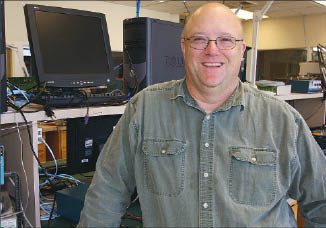
Home » New, upgraded college programs on tap for next fall
New, upgraded college programs on tap for next fall
Offerings to include degree in wine business, training to install home electronics

June 4, 2009
Spokane-area colleges and universities are gearing up new degrees and areas of training ranging from an environmental-studies major to certification in big-rig truck driving.
Gonzaga University says it will upgrade its environmental-studies program to a full-fledged major and will offer a new major in biochemistry starting next fall.
The environmental-studies degree will require students to take a minimum of 36 credits through the environmental-studies program, which Gonzaga will upgrade from its current concentration of related courses, says Jonathan Isacoff, who will direct that program. The university also will offer a 20-credit minor in environmental studies.
Because the environmental-studies program is interdisciplinary, upgrading it won't require significant new resources, such as the hiring of new professors, Isacoff says. The program currently serves 48 students and has a faculty of 22, he says.
Isacoff says he anticipates the number of students in the program will grow rapidly thanks to the new major.
With the addition of the biochemistry major, Gonzaga's chemistry department will be renamed the biochemistry and chemistry department, says David Cleary, department chairman.
The 71-credit biochemistry major is designed to meet growing interest in that field, and the major will include courses in analytical, physical, organic, and inorganic chemistry, Cleary says.
Whitworth University
Starting in the fall, Whitworth University will offer two new health-science majors under a new academic department, named the health sciences and kinesiology department.
The Presbyterian Church-affiliated university just north of Spokane will offer bachelor of science and bachelor of arts degrees in health sciences, says Michael Ediger, chairman of the new department.
The bachelor of science degree will be for students pursuing science-based graduate programs or health careers, and the bachelor of arts degree will be intended for those interested in social or public health issues, graduate programs that don't require a heavy science background, or careers in fitness and wellness, Ediger says.
The health-sciences curricula will include courses in biology, chemistry, medical microbiology, anatomy, and physiology.
In conjunction with the new degree programs, the health sciences and kinesiology department will include nursing and athletic-training majors, Ediger says.
"Those programs have been all over campus," he says. "Hopefully, within a couple of years, the department's programs will be all in one physical building."
Washington State University
Washington State University, in Pullman, Wash., will offer a new major in wine-business management through its school of hospitality management, starting this fall.
Students in the program will be educated in wine business and related areas ranging from wine production to marketing and distribution, says Justin Marquart, WSU spokesman. Marquart says 10 to 20 students are expected to declare the new major in the first year. The wine-business management major won't require any new faculty, he says.
"It's resource neutral," Marquart says. "The courses already exist."
WSU created the major because people entering Washington's growing wine industry in the last few years have expressed a desire for more business training, he says.
WSU also offers a degree in viticulture and enology—the study of grapes and wine.
Community Colleges of Spokane
New offerings at Spokane Community College, in east Spokane, include a home-technology integration program. The program will prepare students to install and integrate home-electronic and entertainment systems, including home-theaters, basic computer networks, security systems, and cable and satellite TV equipment, says John Barnett, the course instructor.
The two-quarter evening classes will serve up to 16 students, and will be set up for entry-level training as well as for certain businesses with employees who need to refresh or catch up on home-technology integration, Barnett says.
SCC also will begin offering professional truck-driver education and training through newly structured courses in its diesel-heavy equipment (HEQ) department. The program will allow students to earn commercial drivers' licenses through a stand-alone series of four courses, says Mark Franklin, chairman of the HEQ department.
The program recently was approved by the Washington state Board for Community and Technical Colleges as well as the state Department of Licensing, Franklin says, adding that professional truck drivers are in high demand.
The series will have one dedicated instructor, and it will serve up to 18 students per quarter, he says.
Spokane Falls Community College, in northwest Spokane, will offer a series of three courses in Salish, an American Indian language spoken historically in several dialects in Eastern Washington, North and Central Idaho, western Montana, and southeast British Columbia, says Dan Wenger, SFCC's dean of arts and humanities.
The courses, which will total 15 credits, will be taught through a partnership with the Spokane-based Center for Interior Salish. The series of courses is set up to handle up to 28 students a year, Wenger says.
Salish is considered an endangered language, because it's spoken only by a handful of native speakers, most of whom are more than 65 years old, he says.
SFCC has hired a Salish speaker as a part-time instructor for the program.
Eastern Washington University
Beginning in the fall of 2010, Eastern Washington University will offer a mechanical-engineering major at its main campus in Cheney. The program, which will be an enhancement of its 21-year-old mechanical-engineering technology (MET) program, will accommodate up to 120 mechanical engineering students and 30 to 40 MET students, says Judd Case, dean of EWU's College of Science Health and Engineering.
The school has had a mechanical engineering technology program in place for 21 years. "Having a successful and accredited MET program means that we are already prepared with almost everything we need in regard to equipment and faculty to launch a mechanical engineering program," Case says.
Latest News
Related Articles


![Brad head shot[1] web](https://www.spokanejournal.com/ext/resources/2025/03/10/thumb/Brad-Head-Shot[1]_web.jpg?1741642753)

